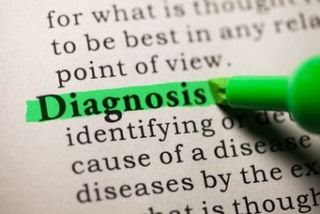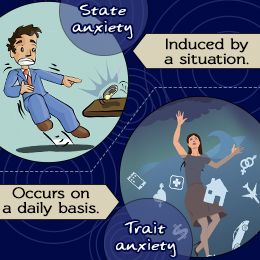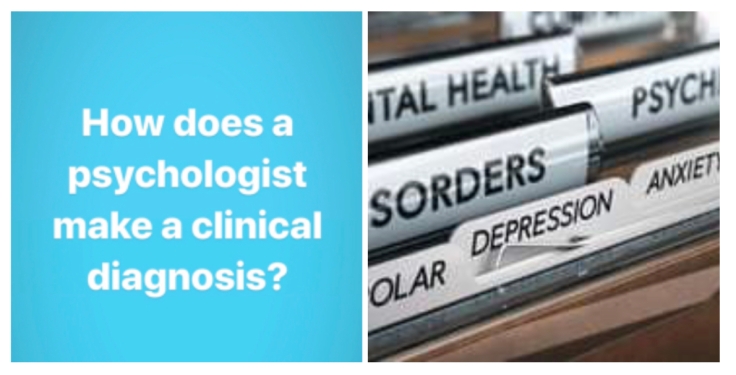Psychology in Your Life
The intention for this post is to introduce you to one aspect of the diagnostic process — specifically: differential diagnosis.
And ultimately to help you understand that psychological assessment is a complex, worthwhile process.
What’s normal 🆚 clinical?
To answer that question, I would like to invite you into my clinical psychology class.
Specifically, when I teach the concept of “Differential Diagnosis” using the STATE versus TRAIT anxiety distinction.

STATE 🆚 TRAIT ANXIETY
Misdiagnosis
People often believe they have generalized anxiety or panic disorder, when in fact, what they are experiencing is an acute reaction to a short-lived, stressful circumstance.

Differential Diagnosis
For example, STATE anxiety involves temporary and situational symptoms to stress inducing events (public speaking, midterms, first dates) universal to all of us.
In contrast, TRAIT anxiety has more lasting, debilitating, and pervasive symptoms (eg., impacts all aspects of an individual’s life) independent of external events.
Psychology on Campus
For additional insights into the diagnostic process, including how I teach this concept in the liberal arts program, check out my latest video:
Reflection Questions
1. How is understanding the state 🆚 trait distinction applicable and/or helpful in your daily life?
2. Have you ever jumped to the conclusion about yourself or someone else regarding a diagnosis, only to discover later that the condition was temporary?
3. What psychology topics and ideas would you like to learn more about?
Dr. D 📕❤️




This is helpful Dr. D. Is it possible to misdiagnose a condition and then the person falls int a self-fulfilling prophecy because they believe it’s trait, when it’s just state?
Great question Dr. G! 100% for sure.
This is why I am so weary of teachers and physicians and parents who are untrained in psychology casually suggested a child has “ADHD” or similar conditions.
The self-fulfilling prophecy is alive & well in today’s world. Especially on campus and in early years education.
Similar to the “Pygmalion in the Classroom” research done so many years ago.
https://en.wikipedia.org/wiki/Pygmalion_in_the_Classroom
Brilliant! I work with people in transition and so much of what I see is state anxiety–but I’ve never had or heard of a term for it before. Thank you so much for this. It’s a legitimate encouragement for those who are feeling like everything is falling apart because life has dramatically changed for them in a brief time. They’re not crazy! Thank you for the words to help them–and me–understand this!
My pleasure Gayle! Thank you for letting me know how applicable it is to your work. Knowing the distinction between transient vs. chronic conditions helps in all ares of health AND life. Hope you have a chance to watch the video too (it’s at the bottom of the post). I share some additional examples there too. Have a wonderful night! You made mine shine! 🌝✨
How to stop endless thoughts??
We can’t stop our thoughts – but we can empower them 💭 🚀
The topic of many of my 100+ short psychology videos.
This should get you started:
Thank you so much I will check them out.🙂
This post is very helpful in clarifying and defining terms. Thank you for posting. Have a great day!
My pleasure! Thanks for the feedback John.
Hope you have a chance to watch the video too
Happy Fall! 🍂
I will check it out, Dr. Andrea. Happy Fall to you, too!
Andrea a very helpful post highlighting the difference between transient and chronic stress. Our daughter Emma has struggled with anxiety, GAD for years. Just recently she has accessed CBT sessions which are really helping and she is reading and learning a lot about herself from an excellent book ‘A New Earth’ by Eckhart Tolle which has opened up many helpful new perspectives for her. This might be of some help to others.
Thank you so much for sharing. You have summarized my post so beautifully with the inclusion of transient vs. chronic stress. A distinction that is so critical, with today’s youth especially.
I also appreciate you sharing about your daughters generalized anxiety, including the tools and resources that have been helpful over the years.
A New Earth is one of my favourites too. Please share the following link with your daughter to a series Oprah did with Eckhart Tolle on the book.
This is one of several step by step online classes:
https://m.youtube.com/watch?v=Mz0e9LrOsyk
Give your daughter a big hug for me! Please let her know how much I admire her courage and hard work . This includes her Mom too! 🤗🤗
Bless you, what a wonderful gift to wake up to today! And thank you Andrea, for sharing so much of your time and expertise via your blog, which I admire and which couldn’t happen without huge commitment on your part! I am grateful for your insights, as you know, which have had a positive impact on my life, helping me realise that it takes strength to stop and slow down and accept our efforts as good enough. I’m only too glad to share this turning point for Emma and us, as I know how other mothers in similar situations feel. I hope for every kindness you share today Andrea you receive a dozen in return which light your heart. Le grà, Marie
You are amazing Marie. Thank you so much.
I can feel your blessing in my heart. 🙏💖💖
Thank you for this subject and video, Andrea. I would be interested to know what causes one to become highly paranoid believing that practically everyone is against them. Thank you in advance!
Hi Syl!
Great question. One that would require a seat in my 15 week clinical psychology class.
Which is why I cannot speculate on my blog as there are a 100 explanations (and differential diagnoses) for this type of clinical behaviour.
Though I can offer a credible APA site for you to do your own research/ homework.
APA Link below –
https://www.psychiatry.org/patients-families
Enjoy your homework!
Andrea 📕❤️
Hi, Andrea!
Thank you very much and I will check the link and do some research. I appreciate your feedback always 😊
My pleasure Syl! I am so happy that you put me to “the test”. Sharing psychology resources on my blog = so rewarding. Have a terrific Tuesday!
You are a source of inspiration as well as information and it is appreciated. Have a wonderful Tuesday!
Thank you so much! 🙏☀️
You’re very welcome 😊🌞
1) My discernment sees that”Traits” are just hangovers of “States” from a previous coping or moreover NOT-coping strategy me thinks. That each time it is best to try to get the thinker to question if what is being thought is actually true, and to pursue any alternative thoughts that might be more true. To look for evidence of an alternative, without belittling the persons feelings and acknowledging them. 2) Nope, not that I can recall as I think all things are temporary. 3) Not sure I do really, but thanks for asking.
Interesting answers! 📒🔥
State or trait. This is so timely for me Andrea. And so interesting. My 21yo daughter has recently seen a psychologist who told her she’s in a perpetual fright or flight state. I presume this is “trait”. This appears to be at the root of so many of her problems. Doesn’t matter where she is she suffers headaches, stomach issues and anxieties that I’ve long thought were the result of stress. She understands that stress is an underlying factor but finds it hard to really address it. I wish I could do more to help her. But thank you for this video and explanation which clarifies so much. I’ll be watching with interest if you post any follow ups. xx
Thank you so much for sharing Miriam.
I am not surprised by what you shared. I specialize in your daughter’s age group. And there is no doubt that this is the “age of overwhelm” heightened by social media & technology.
This is why I write and film so frequently on the topics of stress, pressure, and anxiety. A byproduct of overstimulation — heightened by trait anxiety (clinically known as generalized anxiety).
Fight vs Flight – brain + nervous system response and solutions is something I discuss in my TEDx Talk
Please share with your daughter and let her know she has a 🇨🇦 cheerleader in me!
TEDX THRIVING UNDER PRESSURE
Hi Andrea, so sorry for the delayed response. This is a wonderful TED talk that I’ve enjoyed it before and one that I’m just about to forward to my daughter. Thanks again for your support. It means so much. 🙏
Very informative video.
I assume that trait anxiety is closer to what is termed “chronic anxiety.” A personality trait? Hard-wired from early/childhood trauma? Treating that must be a huge challenge.
It is helpful to know the difference, although I would guess that it is more of a relief to those with the “state” type. They have hope that it will end!
The distinction is important as the term “anxiety” is often thrown around to describe any emotional discomfort.
“I assume that trait anxiety is closer to what is termed “chronic anxiety.”
Trait anxiety is another term for generalized anxiety disorder (GAD): https://images.pearsonclinical.com/images/assets/basc-3/basc3resources/DSM5_DiagnosticCriteria_GeneralizedAnxietyDisorder.pdf
Love knowing you found the blog post & video helpful.
I really enjoy your questions!
Andrea
Thanks. So do I!
This was interesting and informative. Andrea, let me ask you this. Us labeling our own anxiety and stress. does the actual differentiating of these two types of stress. Can that labeling alone, be somewhat helpful to us? Not sure if I ask this question in a coherent way.
I would think being mindful of the two types of stress, should help us deal with each one, obviously the de-stressing or coping with these two types of stress should be different.
Hope you are well. Have a great week.
Great questions! Thought provoking 💭
Ones that I am going to take some time to reflect upon and get back to you soon with my thoughts.
In the meantime, my video adds some more info:
Stay Tuned! I will get back to you soon ✅
Perhaps, answering the question in a future post may be more beneficial to your followers.
Sorry, if I jumped too far ahead on a topic you wished to discuss at some time in the future.
Take your time.
No need to say sorry! Your questions are excellent and the very reason I love to blog.
“Can that labeling alone, be somewhat helpful to us? I would think being mindful of the two types of stress, should help us deal with each one, obviously the de-stressing or coping with these two types of stress should be different.”
Yes and YES ! The labeling of the two types of anxiety (you can in fact have both state & trait) moves us into the observer mode of our own emotions, situations, and behaviours. Helping us to determine which of the two requires more intensive psychological support, and which can benefit immediately from mindfulness meditation, fitness, and blogging (one of my favourite therapies).
Please keep your queries coming! You take my psychology blog up a notch, every single time.
Have a wonderful week!
Andrea
A very interesting topic Andrea. I have found that having fibromyalgia put me into the TRAIT mode for a long time. Thankfully, that has receded.
Thank you for sharing Brigid. Fibromyalgia teaches us so much about health psychology and the intersection of mind and body. Your work lights the way for so many. A topic that will be added to my clinical psychology roster this Fall. The more students know. The brighter our future will be. 📒💛